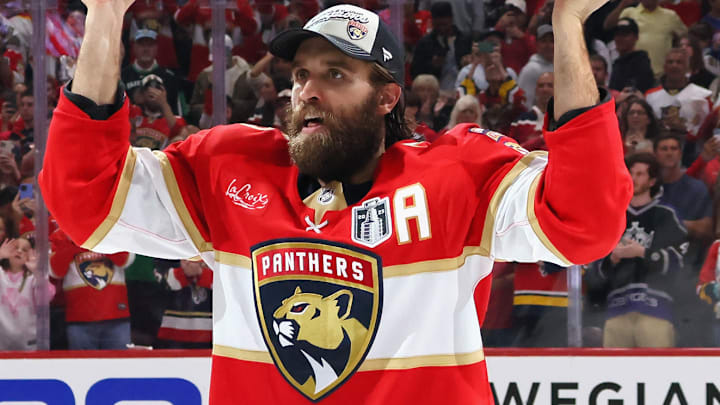In retrospect, the Detroit Red Wings never had a realistic chance of prying Aaron Ekblad away from Florida.
Captain Dylan Larkin may have openly challenged the front office for its inactivity at last season’s trade deadline, but general manager Steve Yzerman did not sit idly when the offseason began. By all accounts, Detroit put forward a lucrative offer to the Windsor native in an effort to bring him home.
Yet sentiment and financial incentive could not outweigh the singular pull of a championship. Ekblad’s decision was as pragmatic as it was predictable: Florida, winners of two consecutive Stanley Cups, remains poised for a legitimate pursuit of a third. In that context, Detroit’s pitch—however competitive in dollars—was destined to fall short.
Reports suggest that Ekblad would have earned more in Detroit than he will under the eight-year, $48.8 million contract he signed to remain in Sunrise. With over $12 million in cap space, it is reasonable to surmise that Yzerman’s offer approached the $8–9 million range annually.
Still, the Panthers’ ability to retain multiple stars on below-market deals, including Conn Smythe Trophy winner Sam Bennett, underscores a deeper truth: organizational culture and sustained winning often outweigh the temptations of cash. Florida’s management has cultivated an environment in which players sacrifice individual earnings for collective success.
That is the hallmark of a franchise operating at its peak
Would Ekblad have transformed Detroit’s blue line? Undoubtedly. But restraint may ultimately serve the Red Wings better than extravagance.
Yzerman resisted the temptation to allocate nearly all of his cap flexibility to one player whose availability is far from assured. Ekblad has not completed a full season in six years, a consequence of recurring injuries compounded by a 20-game suspension for violating the league’s performance-enhancing substance policy. He remains a superb defenseman, yet the raw data suggest a troubling pattern: he is not always there when his team needs him most.
Instead, Detroit spread its resources with careful intention. In John Gibson, the Wings secured a bona fide starting goaltender capable of stabilizing the crease.
The additions of James van Riemsdyk and Mason Appleton promise to strengthen a penalty kill that has long been a liability. Meanwhile, the acquisition of veteran Travis Hamonic introduces the kind of grit and swagger that Detroit’s youthful defensive corps sorely lacked. This was not a flashy offseason, but it was a structurally sound one.
Yes, the franchise’s decade-long playoff drought looms large in the minds of fans. Yet impatience is the enemy of sustainable success.
The Red Wings now possess a promising young core, balanced by strategically chosen veterans, and are positioned for steady progression rather than quick fixes. Yzerman’s philosophy—measured, disciplined, and unflinching in the face of short-term pressures—suggests that the long-awaited return to relevance is less a matter of “if” than “when.”
More from Octopus Thrower
